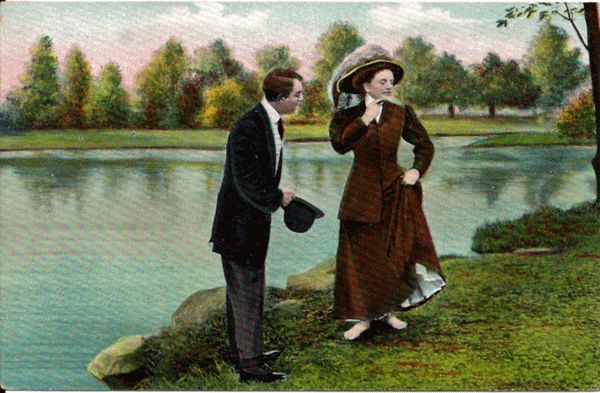
It’s a common belief that timing is everything when it comes to relationship commitments. Besides compatibility and attraction, someone must enter our lives at the right time for it to go somewhere. If you meet the right person at the wrong time, these perspectives and practices will help you make peace with the missed opportunity. (Estimated reading time: 10 minutes)
“If you have chemistry, you only need one other thing: timing.”
— Unknown
As a romantic (and an inquisitive person), I love hearing how couples meet. Countless love stories in novels, movies, and TV shows begin with an unexpected encounter at a party, café, or bar. While that happens in real life, there are also deliberate ways to meet romantic partners.
Your match made in heaven isn’t guaranteed to fall out of the sky, so sometimes, you must take matters into your own hands, rather than leaving it to the whims of fate.
But, whether you meet your match through friends or family, at work or school, at a group or institution, or on dating apps, there is another element of serendipity to factor in: timing. It’s not just about where you meet but where you both are on your journeys when your paths cross.
One of the most fascinating and touching stories that speaks to the significance of timing is about a couple that reunited after 53 years. Dennis Vinar was a well-liked football player and Karen Lehmann was a studious band member who met in 1958 when they were fifteen.
The two were smitten and started seeing each other, despite Karen’s parent’s disapproval of the relationship. When Karen became pregnant, Dennis proposed to her, but her parents urged them to go their separate ways and put the baby up for adoption. Dennis joined the army, and Karen went to college. Eventually, they lost contact and married other people.
Nearly fifty years later, when Dennis divorced, he searched online and found Karen. He reached out and discovered she was widowed. The couple immediately reunited and got married three days later. They even found their daughter and reunited with her.
Stories with happy endings like Dennis Vinar and Karen Lehmann’s are rare and seem magical. Most couples who met at unfavorable times usually move on and have nothing more than the occasional memories of their beloved flash through their mind.
They may have been the right person or even the love of their life, but circumstances made it difficult for them to couple up. The only way to find peace and to get unstuck from “what could have been” is by understanding that timing is everything when it comes to relationship commitments.
The significance of timing in relationships

You’re out and about and suddenly bump into someone you feel immediately connected to. Everything about them is enchanting, and they’re open to getting to know you better. Both of you are on the same page.
Bingo, right? But there’s one problem: they’ve entered your life at the wrong time. You could be in a relationship or married to someone else. You could live on the other side of the world, or you’re fresh off a messy breakup.
Whenever you must close the door on the perfect person, no matter the reason, your heart is heavy as you walk away. Deep down, you know they embody many of the qualities you desire in your dream partner. It’s a cruel twist of fate as you wrestle with the Universe’s decision to bring them into your life at this time and place. Why couldn’t you meet them earlier (or later) when you’re ready?
We don’t have the answers to all the mysteries of the universe. All we can do to make sense of our apparent misfortunes is to reframe them in ways that empower us. As much as we’d like to say that timing isn’t a factor in relationships, it is. In fact, it’s crucial. If two people are at entirely different stages of their life and can’t engage in a meaningful relationship, they won’t last very long.
It doesn’t matter how much you adore each other – you can’t force a commitment to take root if the conditions don’t offer fertile ground for it to flourish and last.
Studies about the timing in relationship success back this up. Timing in this context is subjective and is determined by the people involved. They decide whether it is the right moment to enter a committed relationship.
In an article titled “It’s about time: Readiness, commitment and stability in close relationships,” researchers reviewed the connection between commitment readiness and relationship receptivity. Professor Tan, one of the researchers, said that timing boosts or undermines relationship commitments.
A person is more likely to invest in relationship commitments when there is a higher degree of readiness. The results also showed that higher readiness led to increased loyalty, and both partners were less likely to neglect the connection or search for exit strategies when the relationship endured its challenging phases.
It’s unclear what causes someone to be ready for a committed relationship. It’s personal to each individual. Several factors could influence our readiness, such as financial and career position, age, culture, past or ongoing relationships, self-esteem, personality, and other psychological issues.
It is commonly believed that women have a biological clock; the window of time available to them in which they can conceive. Conversely, men have a financial clock; the stage in their lives when they feel confident in their financial ability to support and raise a family.
We may understand “bad timing” on an intellectual level, but it’s much harder to do when it happens in your own life. Many of us know what it feels like to be in relationships that didn’t work out because one person could not commit.
Does it make us or them a bad person? No. With time, we heal and accept what happened. Que se·rá, se·rá. All we can do is focus on doing our best in the present moment and trust that other doors will open.
The paradox of choice: recognizing the right person
Missing out on relationship commitments isn’t always about timing. We often miss opportunities because of our inability to recognize the right person due to a lack of awareness and maturity to spot a gem when it’s in front of us.
Movies make it look easy, but the reality is that it couldn’t be more complex.
Living in the age of dating apps and websites makes it trickier. We must sift through an abundance of options and determine who is worth our time.
Having so many options is undoubtedly a privilege, but it does not necessarily make us happier. According to Barry Schwartz, a psychologist and the author of “The Paradox of Choice,” when you’re presented with multiple choices, the pleasure you gain from each prospect diminishes because you’re worried about making the wrong choice and missing out.
The trick, he says, is to find the middle ground, the “sweet spot,” that enables you to benefit from variety and not be paralyzed by it.
We can experience that special spark with multiple people. No matter whom you choose, once the novelty of the partnership wears off, you might find your head turned by those who are smarter, better-looking, and more compatible.
To find lasting happiness with your partner, you must be prepared for this possibility. Love is a state of being. It’s something that you nurture and grow over time.
Anything worthwhile requires sacrifice, forsaking other choices, and believing they are the right person for you who entered your life at the perfect time for your personal evolution.
Other factors that influence finding the right person

Favorable opportunity is just as important as good timing. Even if you are available and eager to meet someone, you must be in environments with a steady flow of prospects.
Luck is especially crucial in chance encounters with important people in our lives – not just the love of your life but a dear friend, a mentor, or a business partner. Being at the right place at the right time creates sliding door moments that can alter the trajectory of our lives if we step into them.
If you trace back the events that orchestrated your meeting with these special connections, the role of coincidence is undeniable.
It’s not that those seeking meaningful relationship commitments are doing something wrong or are less worthy of having them — they just haven’t had the fairy dust of luck sprinkled on them (yet).
Predicting how luck makes, or breaks love is difficult, but we can influence it by using probability. Probability is commonly used in areas with pre-existing data, like the weather, gaming, sports, and investment, but it can also help us build a strategy to orchestrate the right opportunities.
The first step is to define the “right person.” What qualities are you looking for in your relationship commitments? Do you have a certain “type” that you’re attracted to? What are your negotiables and non-negotiables?
Getting clear on what you’re looking for will make it easier to narrow in on the places where you can find them. It also lessens the chance of ending up in a relationship of convenience, where you’re only with someone because of surface commonalities and because it’s easy, rather than love and deep commitment.
We maximize our odds (and hence influence our luck) when we go to places with a higher chance of meeting a high-quality, suitable partner. Of course, we can meet them anywhere, but chances are higher if we go to specific environments.
The stars align when we work with our odds and become proactive. This makes it easier to escape the mental trap that there is only one “right person” for us and that if we miss our chance, we’ll be miserable for the rest of our lives. Love is abundantly available; all we need to do is tune into its frequency and believe that we are worthy of it.
How to make peace with the timing of your relationships

While most of us find it easy to leave the past behind and move on from a missed chance with the person we believe was right for us, a few of us can’t let go. As time passes, you wonder what you and that person could have been. You can see yourself living with and loving them in a parallel universe—doing what all blissfully happy couples do.
Sooner or later, reality dawns that the dream died long ago. All that’s left is tender feelings of bittersweet longing. At some point, we must learn how to balance our melancholy with practicality. Here are some things you can do to gain inner peace:
1. Rewrite your story
Our minds are always crafting narratives to explain our experiences and feelings. These self-created stories are often distorted by the passage of time and our blind spots.
By questioning those narratives, we can become objective about them and weed out perceptions that aren’t serving us. For instance, instead of seeing your relationship as a tragic loss, you can focus on the good times and view it as a learning experience that made you stronger and wiser.
2. Take them off the pedestal
Those that get away are featured as larger-than-life characters in the story of our lives, that knight in shining armor (or enchanting princess) who rescued us from the doldrums of everyday living.
Taking them off the pedestal does not diminish their significance, but rather, it humanizes them and reduces the fantasy element. Instead of seeing them as irreplaceable, we open to the possibility of meeting someone even better.
3. Deal with regret
Regret is a heavy emotion that can rob you of your happiness in the present. It’s tempting to dwell on what you did wrong or could have done differently.
Instead of letting your feelings fester within you, process them by writing them down in a journal and taking a close look at their truth.
4. Practice radical acceptance
Radical acceptance is the practice of embracing, with your entire being, what is happening in your life right now. Rooted in Buddhist principles, the act advocates us not to fight a reality outside our control because it leads to emotional suffering, which could be even greater than the situation that caused it.
This does not mean that you have to like the circumstances that led to your estrangement from your romantic partner – but it does mean accepting that it happened so that you liberate yourself from the weight of the pain and move on.
5. Focus on the lessons, not the loss
Like other painful experiences, we can gain immense insight by highlighting the lessons. As Dr. Phil said, “If you learn from an experience, it’s tuition. You’ve paid for an education. If you don’t, you’ve paid a penalty.”
If you are drowning in what you should have done or said, list what you learned about yourself and how you’ve changed instead. You may be a better communicator or more willing to take risks and share your feelings.
6. Fill your days with meaningful activities
People often get stuck in memories of missed opportunities because they don’t have things they are passionate about. The key is to make our present circumstances engaging and fulfilling so we don’t need to escape into a hopeful fantasy.
While it’s okay to let our minds wander to fond memories occasionally, keep your focus on moving forward and maintaining a positive outlook for the future.
Timing may be crucial in relationship commitments, but that does not mean we should be passive. By being proactive and deliberate, we let Higher Forces know we are serious about manifesting what we desire. When we do this, we knock on the door of serendipity which can open to bring in all kinds of opportunities and good fortune.
All my best on your journey,
Seline

Questions for you: Do you think timing is everything in relationship commitments? Is this something you witnessed in your life or someone else’s?
Did you like this post? Sign up below, and I’ll send you more awesome posts like this every week.

Hey Seline!
I had this happen in my life. I ended up marrying the man I dated back in college. But we spent nearly 7 years apart and not talking as our lives when different directions. We met later and connected like we never had before when we were younger. And we were also in better places in our personal lives. It was the right time and we have been together for nearly 10 years now.
Thank you for this wonderful post! – Joyce
Love hearing stories like this. It gives me hope that there can be a better ending for someone like me Thank you for sharing this with us and for letting us share this moment with you! I don’t know when my happy ever after will come but I am going to keep waiting for it!
I think it is important to remember that we change- life is not meant to be stagnant. What works or seems good at one point in life might not be the best later on. Relationships fail or friendships grow- things change and as scary as that can be I think we need to remember this also can apply to relationships sometimes.